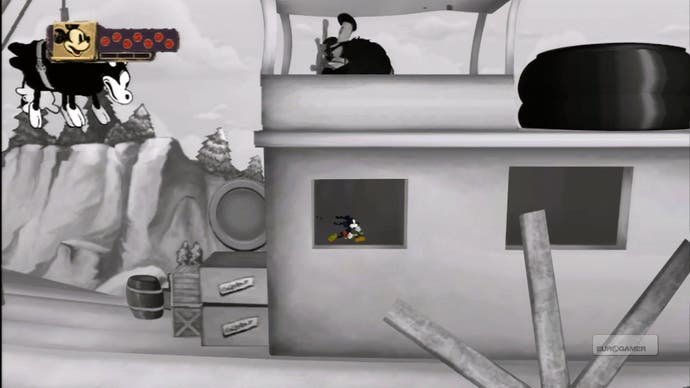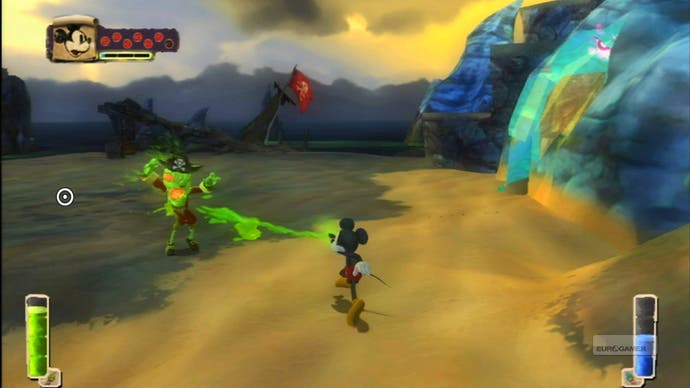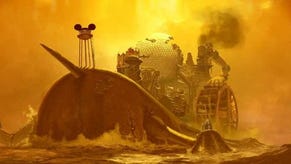Disney Epic Mickey
The ink crowd.
Graphically, the game does a great job of capturing the distinctive look and feel of Disney's 1930s cartoons, and the animation is thankfully up to the task. Characters lope and lollop about with the unique elastic gait that typified the early days of Hollywood animation. It's a style that is rarely seen today, and it helps give the game a unique visual identity.
The same can't be said of the places they inhabit. With all of Disney's fertile worlds to choose from, everywhere feels very drab and videogamey with lots of dark blue sheet metal floors, brown palm trees and pea green pools of toxic goop. It fits the idea of a twisted reflection of Mickey's world, but that doesn't make it any more fun to explore, especially with the aforementioned camera issues.
Taking Mickey Mouse on an existential journey through the dark side of his own legend is an undeniably bold move, but the game's stop-start narrative struggles to develop the themes into anything substantial, while the moment-to-moment gameplay frequently shoves the concept to the background in favour of clichéd platforming tropes and simplistic "find X number of item Y" quests.
Mickey himself makes for a curiously muted and blank hero. He never seems bothered by the situation, and is simply ordered about, fixing machines and collecting stuff because NPC characters tell him to. There's no voice acting, just a series of squeaks and burbles as you tap A to advance through reams of dialogue captions, and the much-vaunted elements of choice do little to flesh him out. There's no way they were ever going to let you turn Mickey evil, so your moral choices boil down to "be nice" or "be a bit selfish but still quite nice".

There are other gameplay options open to you, however, and it's here that the touch of developer Warren Spector's Junction Point studio is most keenly felt. It's possible, for example, to avoid boss fights entirely, provided you've performed a task to help them out before the encounter. Gremlins freed along your journey will also pop up later with bonus assistance, while there's usually at least a couple of ways to proceed through each area. Free the right Gremlin and they'll fix whatever machine you've been told to repair, saving you the trouble of hunting around for widgets.
It's a cute idea in theory, but hardly a brave new dawn in interactive navigation. As the game's slightly lumpy construction makes exploring the world something of a chore, I found I was perfectly content to go with whichever solution I stumbled across first rather than wrestle with the camera in search of a notionally different way of achieving the same goal. That's a choice of sorts, I suppose, but the notion that Mickey inhabits a flexible, living world that reacts dynamically to his actions never really rings true.
Despite the promises, there's really very little that feels new or surprising here. Kingdom Hearts already did the Disney mash-up thing with more scope and daring, Mickey Mania took us on side-scrolling journeys through classic 'toons back in 1994, and it seems that almost every game offers some kind of half-hearted stab at moral choice these days.
Epic Mickey is at its best when it stops trying so desperately to reinvent both its star and genre, and simply concentrates on being a fun Mickey Mouse game. After a sluggish and frankly boring start, the story picks up after about four or five hours and the game's RPG adventure tendencies begin to take flight.

You're still schlepping around, hunting for flowers, masks and other inventory trinkets, but a little breathing room makes them feel like actual quests, not just linear platform game objectives dressed up as something more. Whether the game's intended audience of families and kids will stick around long enough to find those nuggets of entertainment is another question.
For all its big ideas, Disney Epic Mickey never quite weaves its disparate strands into a convincing whole. Its conceptual ambition is let down by merely adequate mechanics, and Mickey himself remains a rather abstract figure at the centre of it all.
Fundamentally, Epic Mickey misunderstands what people love about Mickey Mouse. He simply doesn't fit in this grim, post-modern dystopia, dripping with bitter-sweet nods to forgotten corners of Disney lore, nor does he need to confront his dark commercial heart to stay relevant in 2010.
He just needs to be Mickey, with blue skies, wholesome adventures and bright primary colours. A game with the breezy aesthetic and technical polish of Super Mario Galaxy, starring Mickey, Donald, Goofy and friends would do more to rekindle our affection for the mouse than this admirable but flawed attempt at forced reinvention.


